Does Watermelon Raise Blood Sugar? Glycemic Index & Sugar Content

Key Takeaways
- Glycemic Index (GI): High (72–80).
- Glycemic Load (GL): Low (4–8 per serving).
- Sugar Content: 9–11 grams per cup.
- Verdict: Generally safe in moderation due to high water content, but individual glucose responses vary.
- Glycemic Index (GI): High (72–80).
- Glycemic Load (GL): Low (4–8 per serving).
- Sugar Content: 9–11 grams per cup.
- Verdict: Generally safe in moderation due to high water content, but individual glucose responses vary.
Watermelon is a refreshing fruit consisting of 92% water, but its sweetness often leads to questions about its impact on metabolic health.
The Nutritional Benefits of Watermelon
The Dietary Guidelines for Americans recommend eating 1.5 - 2.5 cups of fruit daily.
This likely comes as no surprise to many since fruits are excellent sources of nutrients, including fiber, vitamins, potassium, folate, and antioxidants. These nutrients can contribute to improved heart health, immune system health, and digestive health. And watermelon's high water content can help improve hydration, too.
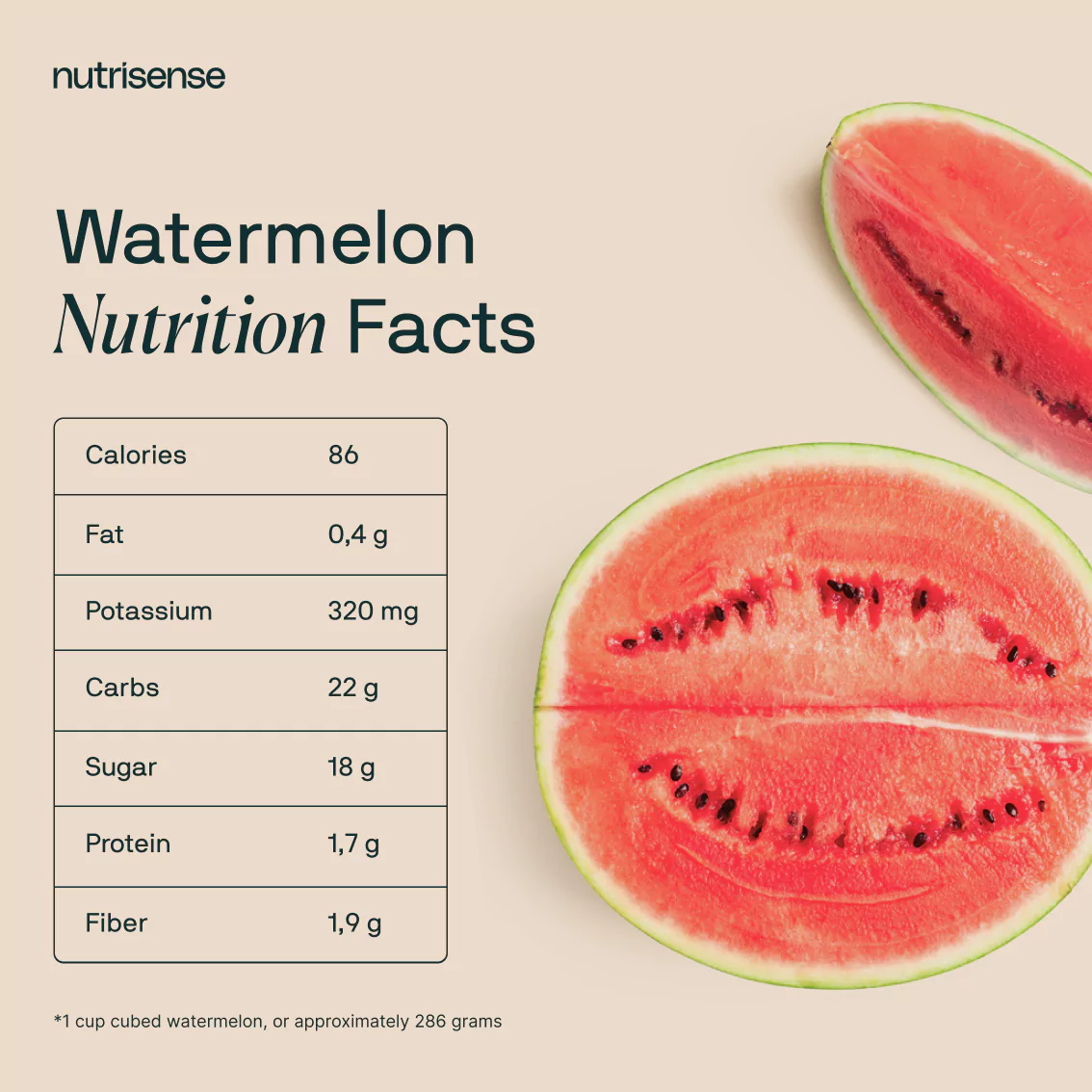
Here’s a little more about the nutritional benefits:
Potassium
Most Americans don't get enough potassium in their diets. This fruit is high in potassium, a mineral your body relies on for proper kidney, heart, and nervous system function. This mineral may also counter the effects of sodium to help improve blood pressure.
Vitamin A
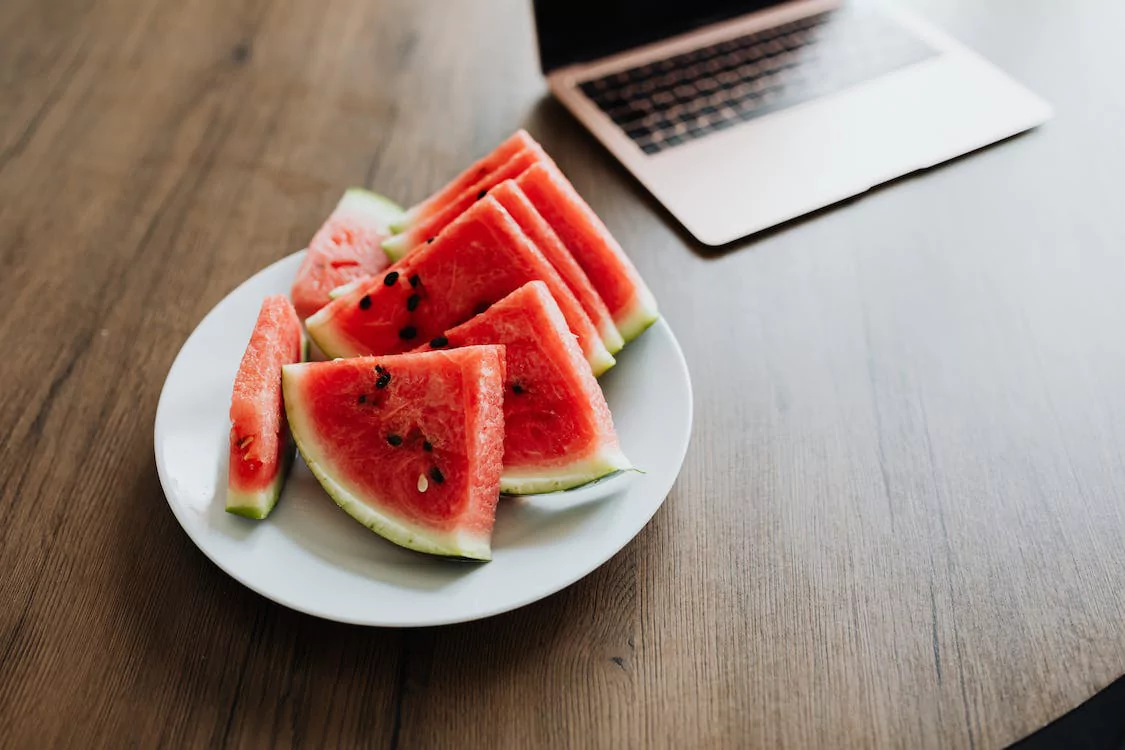
The typical serving size of a watermelon (one cup diced) contains 33 percent of the recommended daily amount of vitamin A. This vitamin is crucial to immune function, vision, and growth and development. It supports cell growth and is crucial in maintaining the heart, lungs, and eyes, among other organs.
A 2017 study found that higher dietary intake of vitamin A may also be associated with a lower risk of bone fractures, though more research is still needed.
It may also reduce the risk of cancer, as vitamin A deficiency has been associated with an increased risk of cancer. While this research is promising, the relationship between vitamin A and cancer remains unclear.
Vitamin C
One serving of watermelon has 21 percent of your daily recommended amount of vitamin C. Vitamin C is required to produce collagen, which supports healthy skin, bones, tendons, and connective tissue.
Vitamin C is one of the antioxidants in watermelon. Along with vitamin B6, it fights off free radicals in the body that can harm cells and DNA. Additionally, it plays a crucial role in supporting immune system function, wound healing, joint health, and reducing the risk of infections.
It may also regulate blood sugar and blood pressure. A 2019 study, for example, examined 31 people with type 2 diabetes to see how vitamin C supplements affected their blood sugar after meals.
The study found that vitamin C significantly decreased their daily post-meal blood glucose levels and blood pressure after four months of the study.
L-Citrulline
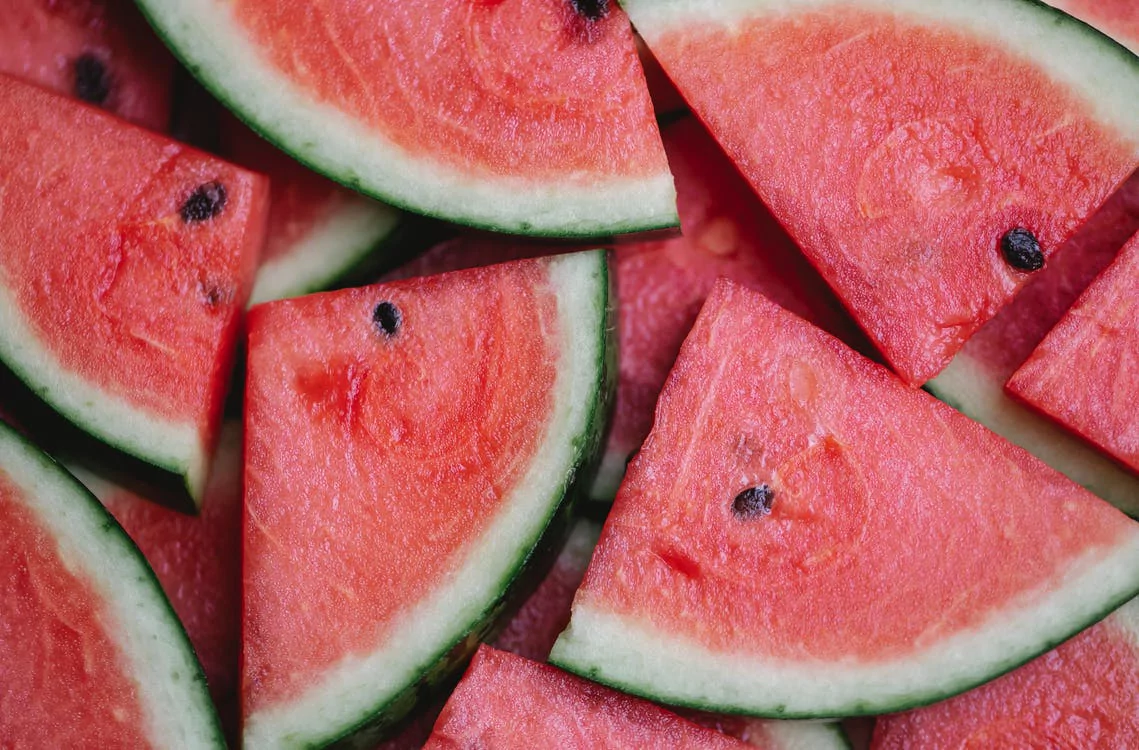
L-citrulline is an amino acid found in watermelons. Studies have found that citrulline may reduce the risk of cardiovascular disease by improving blood pressure. Animal studies have shown that it may protect against endothelial dysfunction, a coronary artery disease.
However, many studies on L-citrulline have been short-term and pre-clinical, meaning that more research is still needed to determine a definitive link between L-citrulline and heart health.
Lycopene
Watermelon contains lycopene, an antioxidant that gives watermelon its color. This antioxidant targets free radicals that harm your cells and may play a role in reducing the risk of diabetes, high cholesterol, kidney disease, neurodegenerative diseases, prostate cancer, and heart disease.
Lycopene is the subject of much promising research, but more study is needed to understand exactly how it affects us.
Watermelon and Blood Glucose
Watermelon is full of beneficial vitamins and minerals for overall health. But how does it affect blood sugar? Is it a safe option for individuals with diabetes or anyone following a diabetes diet?
Does Watermelon Contain Sugar?
Yes. A single serving (1 cup) of watermelon contains approximately 11 grams of sugar.
While this is natural fructose, it can still influence glucose levels. However, because watermelon is 92% water, the sugar density is lower than many other fruits. Pairing it with protein or healthy fats (like feta cheese) can help mitigate the glucose response.
While this sugar in watermelon can affect blood sugar levels, its impact varies based on the quantity of watermelon consumed and whether you have it as watermelon juice or in its natural form. Pairing the fruit with good sources of fiber or protein can help some people prevent significant blood sugar spikes.
Is Watermelon a Low-Glycemic Fruit?
No, watermelon is considered a high-glycemic fruit. It typically has a glycemic index(GI) of 72–80
However, GI doesn't tell the whole story. Because the carbohydrate density is low per serving, watermelon has a glycemic load (GL) of 8. This means that while the sugar enters the bloodstream quickly, there isn't enough of it in a standard portion to cause a severe glucose rise for most metabolically healthy people.
In fact, foods with low GL may be safer for blood sugar in small amounts. In the case of watermelon, its moderate dietary fiber content may also help blunt any glucose response that may arise after consuming it.
The GI and GL systems are just one tool that can help you figure out the healthier options for your diet. In a nutshell, watermelon is safe for people concerned about blood sugar spikes, and even those with diabetes to eat in moderation. Of course, to learn whether watermelon (including how much of it, and what foods you should pair it with) is right for your specific needs, it's always a good idea to talk to a healthcare professional, like a credentialed nutritionist or dietitian.
Adding Watermelon To Your Diet
Watermelon can be a nutritious and delicious treat on its own, but there are many other ways to eat it. The whole fruit—even the rind and the seeds—are edible!
To pick the perfect watermelon, choose one firm and free of dents, scratches, or bruises. It should be heavy and have a creamy-colored spot (not white) on its underside to indicate that it was given time to ripen.
Here are five interesting ways to incorporate more watermelon into your diet.
5 New Ways to Try Watermelon
1) Watermelon Gazpacho from Love and Lemons
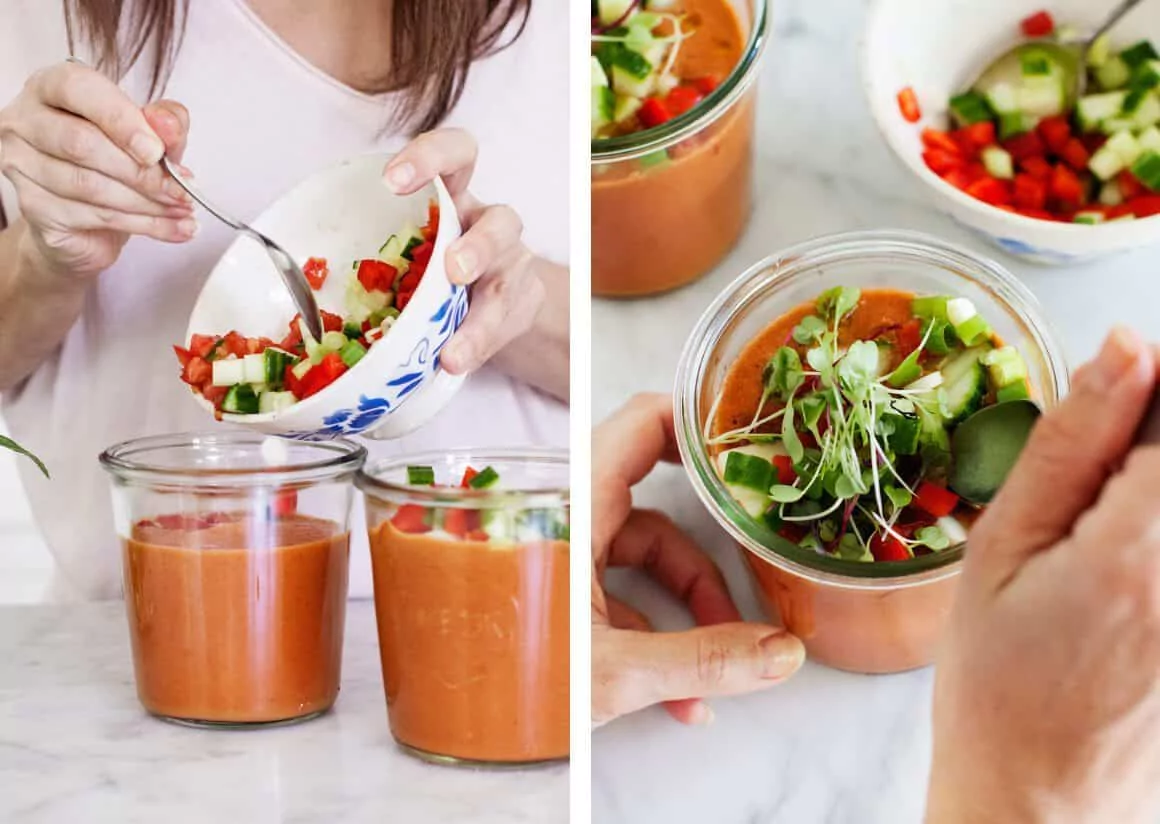
Gazpacho is a traditional Spanish cold tomato soup enjoyed in the summer months. This version adds watermelon to the mix, making it a hydrating and refreshing meal for a hot summer day.
It also contains cucumber, a great source of potassium, and vitamin C-rich tomatoes and bell peppers. Consider adding the avocado for a boost of antioxidants and nutritious fats.
Ingredients
- 4 heaping cups cubed, seedless watermelon
- 1 English cucumber, diced
- 3 medium tomatoes, diced
- 1 small red bell pepper, diced
- ⅓ cup chopped green onions, diced
- 1 garlic clove
- A small handful basil
- 3 to 4 tablespoons red wine vinegar
- 3 tablespoons olive oil, plus more for drizzling
- 1 to 2 teaspoons sea salt, or to taste
- ½ teaspoon freshly ground black pepper
- ½ jalapeño pepper, optional
- Diced avocado, optional
- Microgreens, optional for garnish
2) Watermelon Cucumber Salad from A Couple Cooks
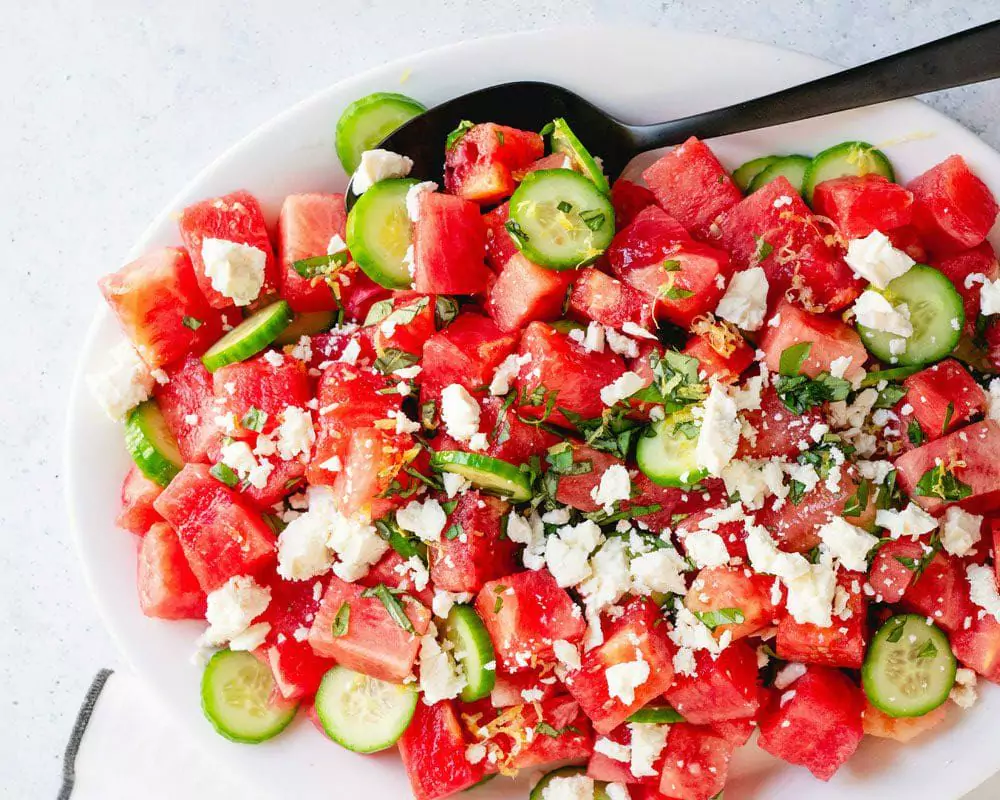
This simple and refreshing salad combines feta cheese with watermelon for a perfect blend of salty and sweet.
Feta cheese contains 260 milligrams of sodium per ounce, so keep that in mind if you're watching your sodium intake. Enjoy this tasty salad after spending time in the pool to give you a boost of electrolytes and antioxidants.
Ingredients
- 8 cups cubed ripe, seedless watermelon
- 2 organic mini cucumbers or ½ English cucumber
- 2 ounces Feta cheese crumbles
- Zest of ½ lemon
- 4 basil leaves
- Sea salt, for garnish
3) Watermelon Rind Pickles from Alton Brown
If you're wondering how to eat a watermelon rind, give these watermelon rind pickles a try. Like any pickle, you can eat these on their own or add them to a salad for an extra crunch.
The apple cider vinegar makes this a great snack for balancing your blood sugar within a healthy range.
Ingredients
- 2 pounds watermelon rind, from a 5-pound watermelon
- 1 cup apple cider vinegar
- 1 cup water
- ¾ cup sugar
- ¼ cup chopped candied or crystalized ginger
- 4 teaspoons kosher salt
- 1 teaspoon red pepper flakes
- 1 teaspoon allspice berries
- 1 star anise pod
4) Watermelon Blueberry Salsa from Love and Olive Oil
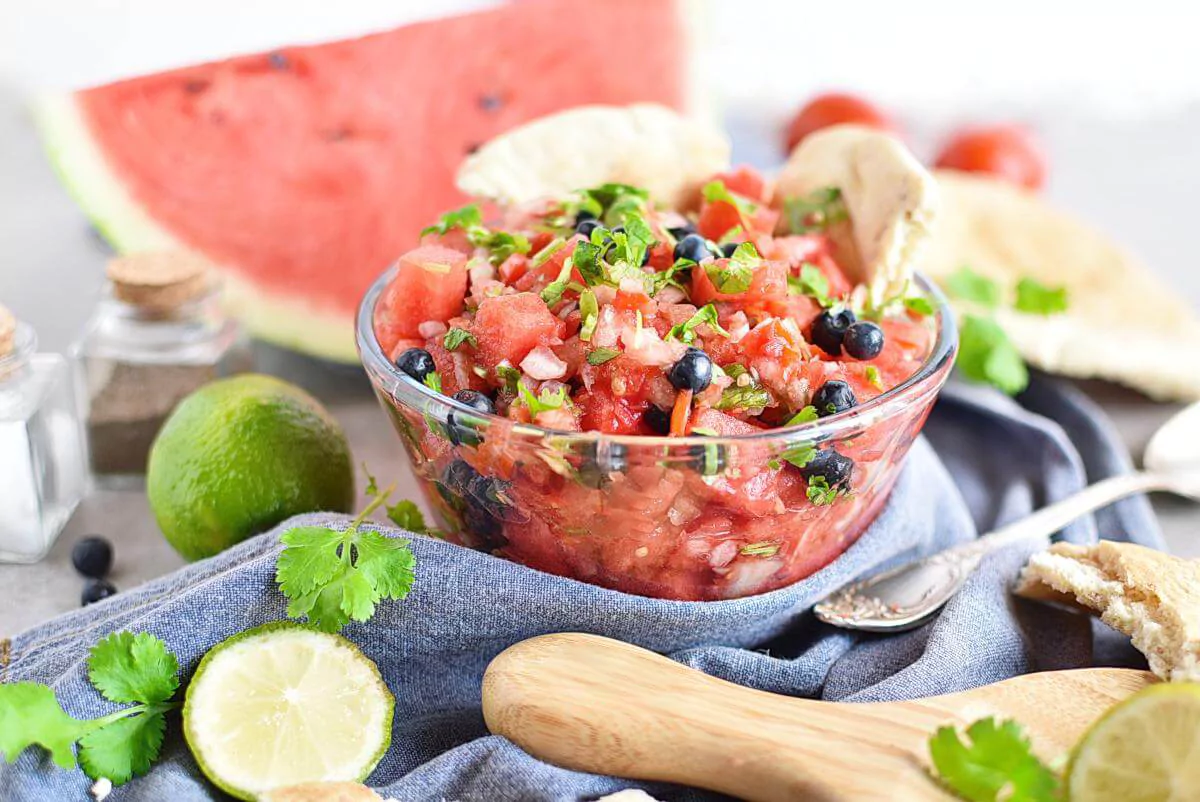
This twist on a classic salsa is full of antioxidants and delicious flavor. From the tomatoes to the blueberries to the watermelon, it makes for a sweet and spicy dip for your favorite dippers.
Ingredients
- 4 small Roma tomatoes, roughly chopped
- 1/2 small onion, chopped
- 1 jalapeno, chopped
- 1 cup diced watermelon
- 1/2 cup fresh blueberries
- 3 tablespoons chopped fresh cilantro
- 3 tablespoons lime juice
- 1/4 teaspoon salt
5) Watermelon, Feta, and Basil Quinoa from How Sweet Eats
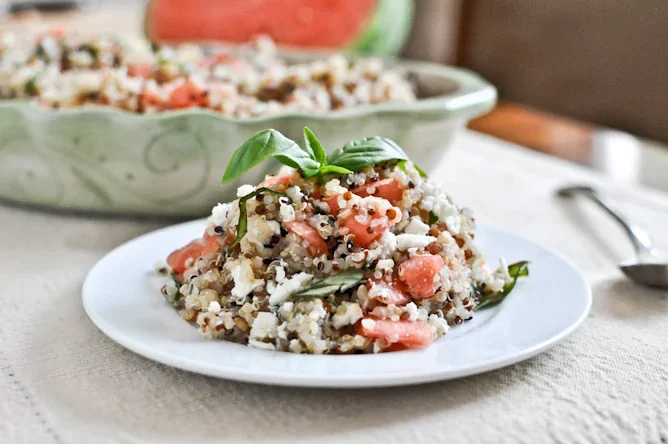
This recipe brings back the sweet and salty combo we love, this time adding quinoa, a nutritious protein, and fiber-rich grain that may have a positive effect on blood sugar and blood pressure for both people with diabetes and people without diabetes.
Ingredients
- 1 cup uncooked quinoa, rinsed
- ¾ teaspoon salt
- ¼ teaspoon pepper
- 1 ½ cups chopped fresh watermelon
- 1 tablespoon honey
- ⅔ cup crumbled feta cheese
- 15-20 basil leaves, chopped
- Juice of 1 lime
Find the right Nutrisense programto turn insight into progress.
Learn how Watermelon Affects Your Blood Sugar Levels with Nutrisense
As much as watermelon and other delicious fruits are full of excellent nutrients, they may affect blood glucose levels differently for each person. If you're wondering what fruits and foods cause you to have blood sugar spikes and imbalances, sign up for the Nutrisense program!
Our team of credentialed dietitians and nutritionists can help you learn more about your body. They use data insights from a continuous glucose monitor (CGM) to track your levels and analyze patterns from your responses to food, exercise, stress, sleep, and more. With this data, they can provide personalized recommendations to help keep your blood glucose levels balanced and under control.
Whether you're trying to reach your health goals or want to learn more about your body's response to food, Nutrisense can be an invaluable tool in your journey toward better health.
Take our quiz to find the perfect fit for your health goals!
Frequently Asked Questions
Can people with diabetes eat watermelon?
Yes, in moderation. Because of its low glycemic load, small portions (1 cup) paired with protein or fat are often tolerated, but monitoring with a CGM is the best way to be sure.
Is watermelon high in sugar?
Watermelon is moderate in sugar compared to other fruits, containing about 9-11g per cup. It is lower in sugar than grapes or bananas but higher than berries.
Does watermelon spike insulin?
Watermelon can stimulate insulin release due to its high GI, but the total load is low. If you have insulin resistance, your response may be more pronounced.
Go Beyond Glucose Data with Nutrisense
Your glucose can significantly impact how your body feels and functions. That’s why stable levels are an important factor in supporting overall wellbeing. But viewing glucose isn't enough. Nutrisense, you’ll be able to learn how to use your body's data to make informed lifestyle choices that support healthy living.
One-to-one coaching
Sign up to access insurance-covered video calls to work with a glucose expert: a personal registered dietitian or certified nutritionist who will help tailor your lifestyle and diet to your goals.
Monitor and measure what matters
With the Nutrisense CGM Program, you can monitor your glucose with health tech like glucose biosensors and continuous glucose monitor (CGM)s, and analyze the trends over time with the Nutrisense App. This will help you make the most informed choices about the foods you consume and their impact on your health.
Find your best fit
Ready to take the first step? Start with our quiz to find the right Nutrisense program to help you take control.

Amanda is a Nutrition Manager and Registered Dietitian, with a Masters in Dietetics from Stephen F. Austin State University. Originally from south GA, she got her undergrad degree from Texas Tech University. She worked at a hospital in Fort Worth, TX, for 4 years as a dietitian, counseling those living with HIV.




